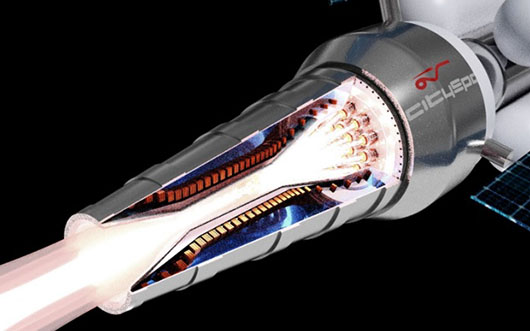Special to CosmicTribune.com, April 3, 2024
By Richard Fisher
A key determinant for future geostrategic space power will be speed, the ability to access distant destinations more rapidly than opponents.
Chemical engines dependent on kerosene, methane and oxygen are very slow compared to the potential of nuclear fission propelled engines, that could halve the time needed to reach Mars.

As such, the United States, Russia and China are racing to develop nuclear fusion space power, with early bets focusing on nuclear thermal reactor (NTR) engines.
But what could trump space fission power?
The answer for many, to include early visionary space science fiction writer Arthur C. Clarke, as early as 1961, was space fusion power.
But more recently, the potential for space fusion power is being highlighted by the 2018 startup Helicity Space Inc., based in Pasadena California and led by Chief Scientist and co-founder Dr. Setthivoine You, who has a Ph.D in plasma physics from Imperial College in London.
The potential for this company and its technology was in turn, highlighted by its April 2 announcement of an investment (amount not disclosed) from Lockheed Martin Ventures, a division of Lockheed Martin that specializes in helping innovative technology companies that could eventually benefit Lockheed Martin.
Lockheed is to build the chemical rocket fuel propelled Cislunar Transporter space tug that will take the Blue Moon lunar landing vehicle of Jeff Bezos’ Blue Origin company to lunar orbit.
Blue Origin and Lockheed are also to build preliminary nuclear thermal engine propelled spacecraft as part of the Defense Advanced Research Projects Agency’s (DARPA) Demonstration Rocket For Advanced Cislunar Operations (DRACO) program.
But with its investment in Helicity Space, Lockheed Martin is positioning itself to respond to future requirements not only to reach Mars more rapidly, but also to enable missions to nearby stars.
Full Text . . . . Current Edition . . . . Subscription Information

You must be logged in to post a comment Login